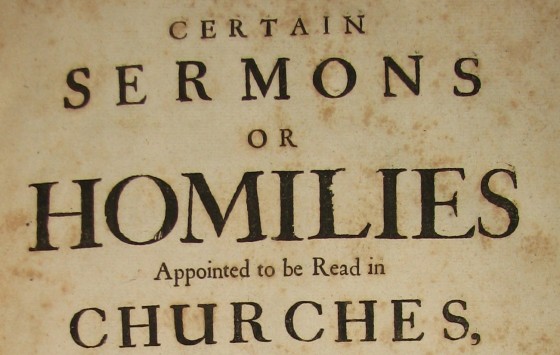
HOMILY ON THE SALVATION OF MANKIND
And so the justice of God and his mercy did embrace together, and fulfilled the mystery of our redemption. And of this justice and mercy of God knit together, speaketh S. Paul in the third Chap. to the Romans, All have offended, and have need of the glory of God, but are justified freely by his grace, by redemption which is in Jesu Christ, whom God hath sent forth to us for a reconciler and peace maker, through faith in his blood, to show his righteousness. And in the tenth Chap. Christ is the end of the law unto righteousness, to every man that believeth. And in the 8th chapter. That which was impossible by the law, in as much as it was weak by the flesh, God sending his own Son, in the similitude of sinful flesh, by sin damned sin in the flesh, that the righteousness of the law might be fulfilled in us, which walk not after the flesh, but after the spirit. In these foresaid places, the Apostle toucheth specially three things, which must go together in our justification. Upon God’s part, his great mercy and grace: upon Christ’s part, justice, that is, the satisfaction of God’s justice, or the price of our redemption, by the offering of his body, and shedding of his blood, with fulfilling of the law perfectly and thoroughly; and upon our part true and lively faith in the merits of Jesus Christ, which yet is not ours, but by God’s working in us: so that in our justification, is not only Gods mercy and grace, but also his justice, which the Apostle calleth the justice of God, and it consisteth in paying our ransom, and fulfilling of the law: and so the grace of God doth not shut out the justice of God in our justification, but only shutteth out the justice of man, that is to say, the justice of our works, as to be merits of deserving our justification. And therefore S. Paul declareth here nothing upon the behalf of man, concerning his justification, but only a true and lively faith, which nevertheless is the gift of God, and not mans only work, without God: And yet that faith doth not shut out repentance, hope, love, dread, and the fear of God, to be joined with faith in every man that is justified, but it shutteth them out fro the office of justifying.
…
For our own imperfection is so great, through the corruption of original sin, that all is imperfect that is within us, faith, charity, hope, dread, thoughts, words, and works, and therefore not apt to merit and discern any part of our justification for us. And this form of speaking use we, in the humbling of ourselues to God, and to give all the glory to our Saviour Christ, which is best worthy to have it.
…
These great and merciful benefits of God (if they be well considered) … move us for his sake also to be ever ready to give ourselves to our neighbours, and as much as lieth in us, to study with all our endeavour, to do good to every man. These be the fruits of true faith, to do good as much as lieth in us to every man, and above all things, and in all things to advance the glory of God, of whom only we have our sanctification, justification, salvation, and redemption: to whom be ever glory, praise, and honour, world without end. Amen.
No comments:
Post a Comment